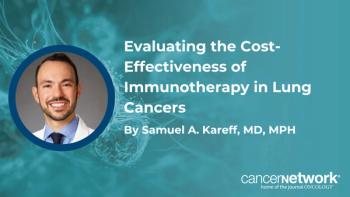
Lung Cancer More Likely Than AIDS-Related Causes to Kill HIV Patients
People living with HIV who adhere to antiretroviral therapy but still smoke cigarettes are substantially more likely to die from lung cancer than from AIDS-related causes, according to the results of a new study.
People living with HIV who adhere to antiretroviral therapy (ART) but still smoke cigarettes are substantially more likely to die from lung cancer than from AIDS-related causes, according to the results of a study
“Using a microsimulation model, we found that ART-adherent people living with HIV in the United States who smoke cigarettes are 6 to 13 times more likely to die from lung cancer than from AIDS-related causes,” wrote Krishna P. Reddy, MD, of Massachusetts General Hospital and Harvard Medical School, and colleagues. “Even when accounting for reported rates of ART nonadherence and loss to follow-up, we found that nearly 10% of people living with HIV initially linked to HIV care (including both smokers and nonsmokers) are expected to die from lung cancer if smoking habits do not change.”
According to the study, more than 40% of people living with HIV in the United States smoke cigarettes, which is more than twice the prevalence among the general population.
The researchers conducted this study to calculate the cumulative lung cancer mortality rate by age 80 and total expected lung cancer deaths among people living with HIV in the United States. To do that, they created a microsimulation model of HIV and applied standard demographic data and recent HIV/AIDS epidemiology statistics with specific details on smoking exposure, combining smoking status (current, former, or never) and intensity (heavy, moderate, or light).
Among 40-year-old men with HIV, the estimated cumulative lung cancer mortality rates were 28.9% for heavy smokers, 23.0% for moderate smokers, and 18.8% for light smokers. In comparison, for those who quit smoking at age 40, the cumulative lung cancer mortality rates were 7.9%, 6.1%, and 4.3%, respectively. Among those who had never smoked, the estimated cumulative lung cancer mortality rate was 1.6%.
Mortality rates were similar among women. The cumulative lung cancer mortality rate for a 40-year-old woman with HIV who was a heavy smoker was 27.8%; for moderate and light smokers, the rates were 20.9% and 16.6%. For former smokers, mortality rates decreased to 7.5%, 5.2%, and 3.7%, respectively. For never smokers, it was 1.2%.
“For 40-year-old ART-adherent men who were current moderate smokers, the combined cumulative mortality from lung cancer and other non–AIDS-related causes-both of which were increased by smoking-was approximately 35 times that from AIDS-related causes (79.9% vs 2.3%),” the researchers wrote. For women in this category, it was approximately 27 times higher (66.6% vs 2.5%).
When the researchers applied model projections to the approximately 644,200 people living with HIV, age 20 to 64 years, in the United States, they found that 9.3% are expected to die from lung cancer if smoking habits do not change.
“Clinicians caring for people living with HIV should offer guideline-based behavioral and pharmacologic treatments for tobacco use,” the researchers wrote. “Lung cancer is now a leading cause of death among people living with HIV, but smoking cessation can greatly reduce the risk. Lung cancer prevention, especially through smoking cessation, should be a priority in the comprehensive care of people living with HIV.”
The researchers noted that the study was limited in part because of its design as a model-based study.
Newsletter
Stay up to date on recent advances in the multidisciplinary approach to cancer.
Related Content


Optimizing the Use of Hypofractionated Radiotherapy in Lung Cancer Care


OncoPrism-NSCLC Test Predicts Key Clinical Outcomes in Lung Cancer









































